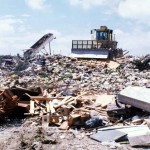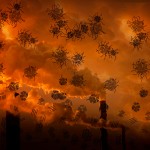Climate coolers
Reducing methane, soot in the atmosphere could curb climate change

Most global warming stories talk about carbon dioxide. That colorless gas accumulates in the atmosphere. There, it insulates the planet like a giant, invisible blanket. But carbon dioxide isn’t the only greenhouse gas. Another, called methane, also traps heats in Earth’s atmosphere (one definition of the greenhouse effect). And it insulates more than 20 times as well as the same amount of carbon dioxide. But unlike carbon dioxide, which can hover for hundreds of years, methane stays in the air for only about 12 years.
So reducing methane might be an easy way to start tackling a big problem.
In a new study, scientists say that bringing down methane emissions may be a quick, relatively simple way to slow down global warming. The scientists also report that making small efforts to reduce soot — the black carbon particles spewed from fires into the air — can help. If people were to lessen the amounts of methane and soot that end up in the atmosphere, people could knock almost a full degree Fahrenheit (half a degree Celsius) off of the warming predicted to occur by 2050.
The scientists report that reducing methane and soot would have another benefit: keeping people alive.
In addition to slowing down warming, reducing methane and soot cleans up the air. The scientists estimate that better air quality could prevent between 0.7 million and 4.7 million deaths per year that would otherwise have been caused by air pollution.
Climate scientist Drew Shindell told Science News that we could tackle two major problems without much effort by cutting back on methane and soot. Shindell says the pollutants are the “low-hanging fruit both for mitigating climate change and improving air quality.”
Shindell works at the NASA Goddard Institute for Space Studies in New York City. He and his colleagues used computer programs to test about 400 different ways to reduce pollutants. Seven tactics focused on methane, another seven on soot. Cutting methane and soot will influence the climate faster than trying to tackle problems due to carbon dioxide, their analyses found.

Not all scientists agree that the recommendations offer a clear-cut solution. Climate scientist Piers Forster works at the University of Leeds in England. He told Science News that cutting methane is probably a good start. But soot is another story. He points out that some of the sources of soot also produce particles that reflect sunlight away from the planet, keeping it cooler.
“If you were to cut out these emissions, you might actually get a warming effect instead of a cooling effect,” Forster told Science News.
Even if the climate effects of cutting soot are uncertain, the study by Shindell’s group points to a huge human benefit from reducing the pollutant. The scientists show that less soot should lead to fewer deaths in countries like India and China, where the black pollution can be inhaled deeply and trigger lung diseases.
Shindell and other scientists know that when people get serious about slowing down climate change, carbon dioxide will be the biggest obstacle. But maybe the world can get a head start on slowing down Earth’s warming by cutting back on methane and soot.
POWER WORDS (adapted from the New Oxford American Dictionary)
methane A colorless, odorless, flammable gas that is the main constituent of natural gas. Methane is a greenhouse gas, sometimes produced in the air when natural gas does not burn completely.
carbon dioxide A colorless, odorless gas produced by burning carbon and organic compounds and by respiration. It is naturally present in air and is absorbed by plants in photosynthesis.
greenhouse gas A gas that contributes to Earth’s greenhouse, or warming, effect by absorbing heat.
soot A black, powdery or flaky substance consisting largely of carbon, produced by the incomplete burning of organic matter, such as coal and wood.







